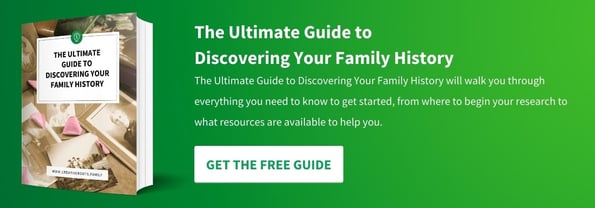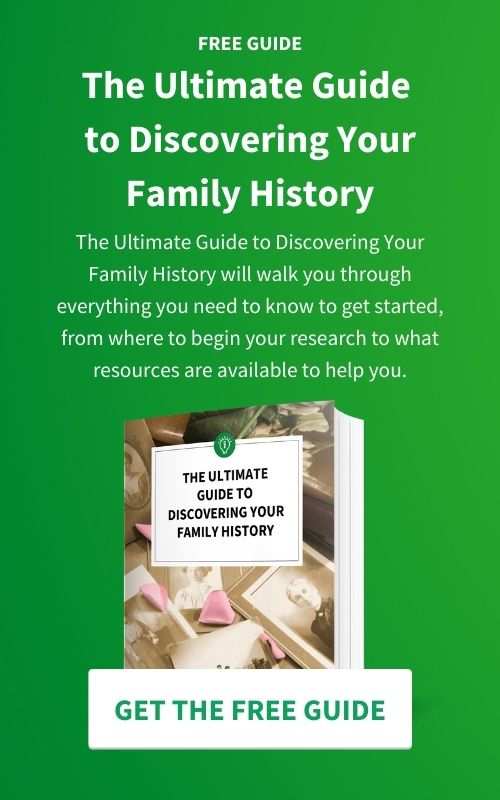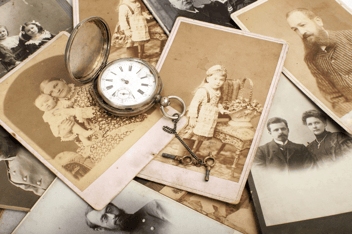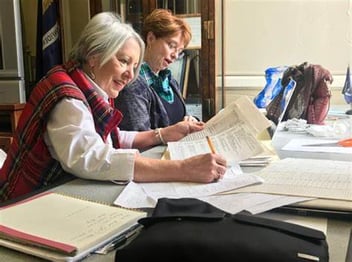How to Get Your Kids Excited About Your Family History
It's never too early to start teaching your children about their family history. Doing so can help them understand their place in the world and where they come from. It can also be a lot of fun! Here are some tips to get your kids excited about learning their family history.
Share Your Own Excitement About Family History with Your Kids
There's nothing quite like learning about where you come from. It can be a fun and educational experience for everyone involved. But how do you get your kids excited about learning their family history? Here are some tips:
- Share your own excitement about family history with your kids. If they see that you're passionate about it, they'll be more likely to want to learn more themselves.
- Talk about the famous people in your family tree. Everyone loves a good celebrity story!
- Make it interactive by involving them in activities such as creating a Family Tree or searching for old photos together
Teach Them About What Family History Is and Why It's Important
Family history is important for kids to learn about because it helps them understand where they come from and who their ancestors were. It can be a fun way for them to connect with their past and learn more about themselves. Here are some tips on how to get your kids excited about learning their family history:
- Talk about why family history is important to you and why you think it’s interesting. Share stories of your own research or discoveries that you found particularly fascinating. Kids will be more likely to get interested in something if they see that adults find it valuable too.
- Make the subject relatable by finding ways to connect it to things your children already enjoy or are interested in. For example, if they like animals, point out how studying family history can help them learn more about the origins of different breeds of dogs or cats; If they’re into sports, explain how understanding where certain surnames came from can give insight into the countries represented at international tournaments; If they love music, look up songs with lyrics related specifically to their family history and have them sing along as you play the music on an instrument or karaoke machine. There are also many books, toys, and games available that focus on teaching children about family history in a fun and engaging way.
- Use technology! Nowadays there are all sorts of apps, websites, podcasts etc. available which make researching and learning about family history much easier and more enjoyable than ever before
Help Them Get Started with Some Basic Research
Teaching your kids about their family history can be a fun and rewarding experience. But how do you get them excited about learning all those names, dates, and places? Here are some tips to get your kids interested in their family tree:
- Start with yourself. Share personal stories about your own childhood, ancestors, and relatives. The more personal the story, the more likely it is to capture your child's attention. You might even want to show them photos or videos of loved ones from generations past.
- Make it interactive. There are lots of great genealogy websites and software programs that let users build virtual family trees. These can be a fun way for kids to explore their heritage while also learning basic research skills. Plus, many of these sites offer games and other activities that make learning enjoyable.
Encourage Them to Ask Questions And Share What They Learn
It can be difficult to get kids excited about learning their family history, but it's important for them to understand where they come from and what makes them unique. One way to get them interested is by encouraging them to ask questions and share what they learn with others. This will help spark their curiosity and make the experience more enjoyable for everyone involved. Here are a few tips on how you can encourage your kids to ask questions and share what they learn:
1) Make it a game: Turn to learn about family history into a fun game that everyone can enjoy. See who can find the most interesting facts or stories about our ancestors. You could even offer prizes for the best researcher!
2) Visit relatives: Schedule some time to visit older relatives who are able to tell stories about our family lineage firsthand. Seeing photos and hearing personal accounts will bring the past alive for your children in a way that reading dry documents never could. Plus, it's always nice spending time with loved ones!
3) Use technology: There are tons of great websites, apps, and software programs available that make researching family history easier than ever before—and much more engaging for young minds too
Celebrate Their Discoveries Together
When your kids start asking questions about their family history, it can be both exciting and overwhelming. You may want to share everything with them at once, but it's important to take things slow and let them absorb information as they're ready for it. Here are a few tips on how to get your kids excited about learning their family history:
1) Start by sharing some of your own stories and experiences. What was it like growing up in your family? What are some of the traditions that you still practice today? Talking about yourself will give them a better sense of where they come from and what makes their family unique.
2) Help them make connections to other relatives. Show them photos or tell stories about people who might be similar to them in personality or interests. If there are any living relatives who they haven't met yet, set up a Skype call or visit so they can put a face to the name.
3) Encourage Them To Ask Questions And Share Their Thoughts With You As They Learn More About Their Family History – It’s okay if they don’t understand everything right away (you probably didn’t either when you were first starting out). By encouraging an open dialogue, you create an environment where curious minds can thrive without feeling pressure to perform perfectly
Share Your Own Excitement About Family History with Your Kids
There's nothing quite like learning about where you come from. It can be fascinating, inspiring and even a little bit daunting! But it's also really important to know about your family history - after all, it's part of what makes you who you are.
So how can you get your kids excited about learning their own family history? Here are a few ideas:
- Share your own excitement about the topic! If you're passionate about genealogy or have had some great experiences researching your ancestors, let your kids see that. Explain why knowing our family story is important and interesting.
- Make it interactive. Kids love games, so try incorporating elements of fun into the research process. Maybe there could be a treasure hunt for old photos or documents, or maybe everyone gets to choose one ancestor to focus on in more depth (with prizes for whoever finds out the most!). You might even want to role-play different characters from past generations - just imagine all the stories they could tell.
- Get creative with storytelling. Family histories are full of rich narratives waiting to be uncovered and shared; encourage kids to use their imaginations to bring these tales alive through art, drama or writing. Not only will this make learning more enjoyable, but it'll help them remember key details too
Teach Them About What Family History Is and Why It's Important
One way to get your kids excited about learning their family history is to teach them about what it is and why it's important. Family history isn't just a bunch of names and dates – it's the story of who we are and where we came from. It can be fascinating, inspiring, and even funny! When kids understand that family history is more than just boring old facts, they'll be more interested in learning about it. Here are some ideas for teaching your children about family history:
1) Explain what family history is. Help them see that it's not just a list of names and dates, but the story of our lives. Use examples from your own life or stories from relatives to illustrate this point.
2) Show them why family history is important. There are all sorts of reasons why knowing our origins matters. Maybe you place a high value on tradition, or maybe you've been able to connect with distant cousins because of shared ancestry research – whatever the reason, make sure your children know why tracing their lineage matters to you (and might even matter to them one day).
3) Share fun facts and stories about your family. Chances are good that you know at least a few interesting things about your own ancestors–share these with your kids! You might not think of these as "stories, "but they can be just as exciting (or even more so!) than made-up tales.
Help Them Get Started with Some Basic Research
Start by helping them understand what family history is and why it’s important. Talk about your own personal connection to your family history and why you find it so interesting. Then, help them get started with some basic research. Show them how to look up census records, birth certificates, and other documents that can give them clues about their ancestors’ lives. Helping them make these connections will be key in getting them excited about learning more about their family history.
Encourage Them to Ask Questions And Share What They Learn
One way to get kids excited about learning their family history is to encourage them to ask questions and share what they learn. This can be done by asking them questions about their own lives and stories, as well as sharing interesting facts or anecdotes about their own family history. When kids see that you're interested in hearing what they have to say, they'll be more likely to want to engage in the process of learning more about their heritage.
Another way to get kids enthusiastic about discovering their roots is through storytelling. You can tell them tales from when you were a child or even make up stories based on the information you know about your ancestors. Kids love a good story, so this is an excellent way to pique their interest and help them understand why learning more about where they come from is so important.
Finally, try involving the whole family in the process of uncovering your shared past. Researching together can be a fun bonding experience for everyone involved, and it will give your children a chance to see just how much there is still left for all of you to discover together.
Celebrate Their Discoveries Together
When your kids start asking questions about their family history, it can be difficult to know where to begin. But there are plenty of ways to get them excited about learning more about their ancestors. Here are a few ideas:
- Talk about what you already know. Share any stories or facts that you remember from your own research. This will help spark their interest and give them something to build on as they continue their own journey of discovery.
- Encourage them to ask questions. Asking questions is the best way to learn, so encourage your kids to do just that when it comes time for family history discussions. They may surprise you with how much they already know!
- Help them connect with living relatives. If possible, put them in touch with cousins, uncles, and grandparents who can share first-hand accounts of family history
Share Your Own Excitement About Family History with Your Kids
Start by sharing your own excitement about learning about your family history with your kids. Talk about why you find it interesting and what you’ve learned so far. You can also show them photos of relatives or tell stories about ancestors to give them a sense of connection to the past.
If your kids seem uninterested, try making it into a game. See who can come up with the most unique ancestor or make up a story about someone in their family tree. You can even offer prizes for the best entries. Whatever you do, make sure that learning about their family history is fun for everyone involved!
Teach Them About What Family History Is and Why It's Important
There are a lot of reasons why you should teach your kids about their family history. For one, it's a great way to bond with them and help them understand where they came from. Additionally, learning about their family history can give children a sense of identity and belonging. Finally, knowledge about ancestors can be useful in times of crisis or when making important life decisions.
So how do you go about teaching your kids about their family history? First, sit down with them and explain what family history is and why it's important. You might want to share some stories about your own relatives or show them pictures of past generations. Next, help them research their own relatives by looking through old photos or documents together. Finally, encourage them to ask questions and continue learning on their own.
Help Them Get Started with Some Basic Research
Researching your family history can be a fun and rewarding experience for kids of all ages. But getting started can sometimes be the hardest part. Here are a few tips to help get your kids excited about learning their family history:
- Start with yourself! Show them how interesting and exciting it can be to research your own family tree. Share stories, photos, and keepsakes that you’ve uncovered during your own research journey. This will help spark their interest and excitement in learning more about their own ancestors.
- Make it interactive! There are lots of great online resources that allow kids to build their own virtual family trees or create other fun projects such as Family History Books or Ancestor Charts. These activities make researching feel like less of a chore and more like an adventure!
- Take advantage of technology! Many websites now offer free access to digitized records which makes searching for ancestors easier than ever before. Help them use these resources to find out where their relatives came from, what they did for work, etc. You may even be able to find some long-lost cousins along the way!
Encourage Them to Ask Questions and Share What They Learn
One way to get your kids excited about learning their family history is to encourage them to ask questions and share what they learn. This can be done by asking them questions about their own lives and families and then sharing stories from their own life and family. You can also ask them to help you research your family history, and then share what they find with you. Finally, you can take them on trips to visit relatives or places that are important in your family's history. By doing these things, you will not only help your children learn more about their heritage but also make it more fun for them.
Celebrate Their Discoveries Together
When it comes to learning about their family history, kids can be both fascinated and intimidated. On the one hand, they might be curious about where they come from and what their ancestors did. On the other hand, all that talk of long-dead relatives can seem a bit boring. So how do you get your kids excited about learning their family history?
One way is to make it interactive. Instead of just sitting them down and telling them stories about grandma's childhood or great-grandpa's immigration experience, involve them in the process. Let them help you research old documents or photos, for instance. Or have them interview living relatives (with your supervision) to learn more about what life was like back in the day.
Another way to pique your kids' interest is by sharing any personal connections they might have to historical events or famous figures. If there's a Revolutionary War veteran in the family tree, tell them how cool it is that they're related to someone who was part of such an important time in American history! By making things relatable and concrete like this, you'll help bring those distant ancestors alive for your children - and maybe even get them interested enough to want to pursue further on their own someday.
When your kids start asking questions about their family history, it can be an exciting time! Here are some tips on how to get them excited about learning more:
- Share your own excitement with them! Talk about why you find family history so interesting and what kinds of things you’ve learned from researching your own ancestors.
- Help them make connections to people they already know. Show them how their grandparents or great-grandparents fit into the larger story of the family. Explain how everyone is connected and why that connection is important.
- Encourage their curiosity by taking trips together to visit historical sites or doing research together online or at the library. Make it an adventure!
Share Your Own Excitement About Family History with Your Kids
Do you want your kids to be excited about learning their family history? Start by sharing your own excitement with them! Tell them stories about your ancestors and what they accomplished. Share photos and keepsakes that have been passed down through the generations. Explain how important it is to know where we come from and how our family has shaped who we are today.
Your enthusiasm will rub off on your kids and they'll soon be eager to learn more about their heritage. Help them get started by doing some research together. Look up old records, interview relatives, or take a trip to visit historical landmarks connected to your family's past. The more involved they are in the process, the more invested they'll become in uncovering new pieces of their puzzle.
Learning about our ancestors can be both fun and enlightening for kids of all ages. So go ahead – let yourself get excited about digging into your family history…and watch as your children follow suit!
Teach Them About What Family History Is and Why It is Important
There's no doubt that teaching your kids about their family history is important. But sometimes it can be hard to get them excited about learning all of the details. Here are a few tips to help you out:
- Explain why family history is important. Help them understand that by learning about where they come from, they can better appreciate the present and plan.
- Make it personal. Share your own stories and experiences with your children and emphasize how those events have shaped who you are today. This will help them see how interesting and valuable their own family history can be!
Help Them Get Started with Some Basic Research
There are a few ways that you can help your kids get started with some basic research about their family history. One way is to take them to the local library and have them look through old newspapers or city records. Another way is to sit down with them and show them how to use an online genealogy database like Ancestry.com. Finally, you could encourage them to talk to older relatives who might be able to share stories and memories about the family. Whatever method you choose, just make sure that your kids are having fun while they're doing it!
Encourage Them to Ask Questions and Share What They Learn
When it comes to family history, kids can be notoriously uninterested. Why care about a bunch of old people they’ve never met? But with the right approach, you can get your kids excited about learning their family history. Here are a few tips:
Encourage them to ask questions and share what they learn. Kids are naturally curious, so harness that curiosity by encouraging them to ask questions about their ancestors. What did they do for work? Where did they live? What were their hobbies? Asking questions will help bring those distant relatives to life for your children. And don’t forget to have them share what they learn with other members of the family!
Make it personal. Family history isn’t just about dates and names – it’s also about stories and experiences. Share some of your own memories with your children and talk about how those moments connect you to your ancestors. If there are any photos or keepsakes from previous generations, show these items off too! The more personal connection your child feels, the more interested he or she will be in exploring further back in time. Use technology as a tool. In today’s world, almost everyone is connected through social media platforms like Facebook, Twitter, and Instagram. There are also numerous websites devoted specifically to genealogy research. Helping your child set up profiles on these sites can make researching feel like an exciting adventure instead of a tedious task. With a little creativity and effort, you can instill a love of family history in even the most reluctant learner!
Conclusion
Learning about one's family history can be a dry and boring affair for kids. But it doesn't have to be! There are many ways to make learning about family history fun for kids. Here are a few tips:
- Make it interactive. Involve kids in the process of collecting family history information. Have them help interview family members, go through old photos, and look for clues in family documents.
- Make it personal. Help kids see how their family history is connected to their own lives. Share stories about their ancestors that they can relate to.
- Make it meaningful. Help kids see how their family history can help them make sense of the world around them. Share stories about how their ancestors faced adversity and overcame challenges.
By following these tips, you can help your kids get excited about learning their family history. And who knows, they might even thank you for it someday!
For more tips on documenting and sharing your family research, insightful analysis of trends using census data, and fun genealogy activities for kids, check out our previous blogs: 7 Creative Ways to Document and Share Your Family Research, Insightful Analysis of Trends Using Census, and Fun Family History Ideas for Kids.
Creative Roots Genealogy is available to help you get started. Contact us at www.creativeroots.family
If you are interested in getting started on preserving your own family's history, we've got a great free guide to help get you organized.


Article by Carol Walsh
Carol Walsh is the CEO of Creative Roots, a professional genealogy company. She has a passion for preserving family history and storytelling. Carol's research methodology centers around fact-finding and publishing in a format that readers can use to preserve the stories. Her ultimate goal is to help families connect with their past and each other.





